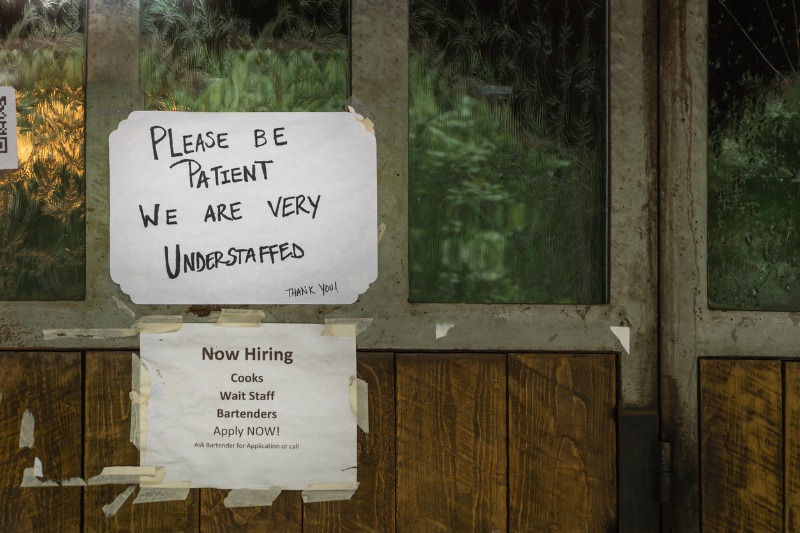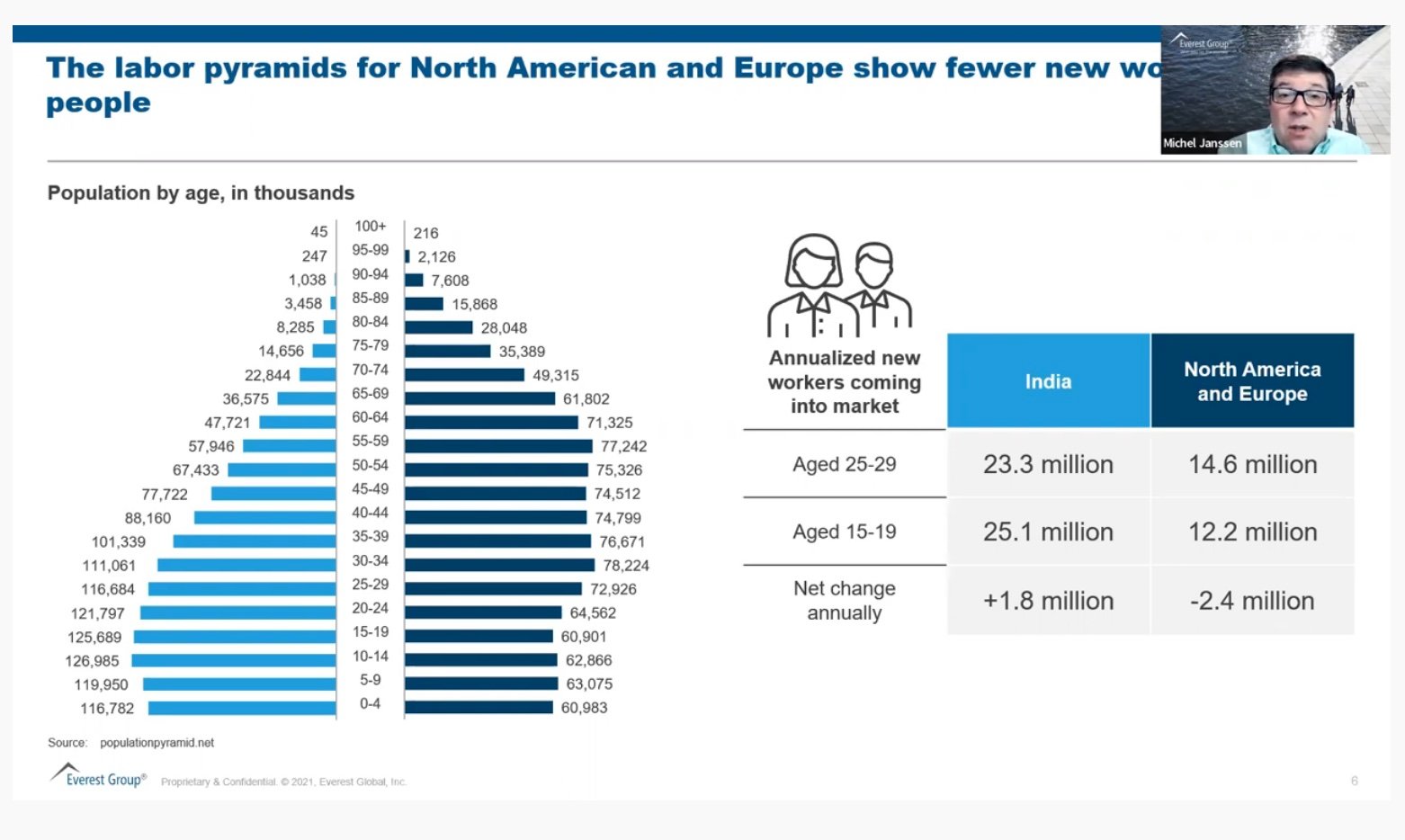
The talent shortage is a new reality that is here to stay. The continuous talent shortage is complex, and its consequences are adversely affecting employers. An Everest Group 2022 Key Issues Study concluded that the shortage will be long-lasting. In this article, we relay vital research talent acquisition leaders need to know about this new talent shortage reality for 2022 and beyond.
Why is The Talent Shortage Here to Stay
The reasons for a long-lasting talent shortage are complex, and the workforce population is the root of that complexity. Michael Janssen, Chief Researcher at Everest Group, pointed out that the decline in the overall worker population could cause the talent shortage to linger into 2032 and maybe beyond.
Janssen noted that the pyramid shows a steady decline in workers entering the workforce. As you can see, North America and Europe are losing 2.4 million workers per year.

India’s population of workers begins to decline between the ages of 20 and 24. India is gaining 1.8 million workers per year. So India could be a solution to the talent shortage. But Janssen shared that India will face similar problems in the future.
Janssen posited five reasons for the decline in the workforce. Jamit Arora, Partner, Information Technology Services, added that these five reasons show that the talent shortage is a long-term reality. The five reasons for the declining workforce population include:
-
Immigration policies
-
COVID deaths
-
Stimulus money
-
Inflationary pressure
-
Changing cultural views of family and work
Immigration Policies
The debate about the impact of immigration on the labor market is not new. Some claim immigration doesn't impact the labor market. Others argue that employment-based immigration can spur economic growth. In comparison, others point to the unintended consequences of restricted immigration policies.
COVID Deaths
Janssen said that over 2 million deaths were related to COVID in North America and Europe. 600,000 of those deaths were of working-age people.
Stimulus Money
While the stimulus money did create momentum for people to stay home and allowed them to rethink their lives, its overall effect on the labor market is a worthy debatable issue.
Inflationary Pressure
Janssen pointed out that lowering costs has always been the focus of organizations. However, he said that inflation is causing business leaders to focus on the cost side of the talent equation. The impact of inflation on salaries also could cause the talent shortage to endure.
Changing Cultural Views: Family and View of Work
"People are rethinking the whole work-life balance and the future lifestyles they will have," Arora said. "These factors are causing people to make decisions about how and where they want to work, which is also impacting participation of a large percentage of the labor force in the in the overall demographics of where people can work."
Everest took a quick poll of employees to find out their thoughts. 25 percent of respondents said that they're happy where they are, but 75 percent said that they're looking for a change.
Another segment of workers is dropping out altogether. Reddit's Anti-work subreddit is a community of 1.7 million self-proclaimed idlers and 92.2 thousand self-proclaiming non-workers.
Suggested Content: The New Old War for Top Talent
The Consequences of The Talent Shortage
Parul Jain, Practice Director for Global Sourcing at Everest Group, said that every talk she had with industry leaders focused on talent. And these leaders told her that the two main challenges with talent are the talent shortage and the pressure the talent shortage places on price and cost.
And the overall talent shortage and price and cost pressures are having many adverse effects on talent acquisition and retention. Employers can't find enough talent and can't keep up with the rising salaries and increased attrition. Jain shared that 69 percent of leaders she talked to can't find enough qualified talent to fill jobs. Another 59 percent told her that the rising attrition rate is a big challenge. And a third of the leaders Jain spoke to told her that the pace of salary increases is so fast they can't employ an entire team.
The impact of the talent shortage is global, challenging companies in North America, Western, and Eastern Europe, and India. Despite its large workforce, India is experiencing talent shortages. The Philippines, Malaysia, and China are experiencing distinct struggles.
The price and cost pressures are causing salaries to rise and creating wage competition. The most significant salary raises are in IT services. At the same time, the retail sector has experienced pay rate increases.
The wage competition is primarily within industries. For instance, the retail sector has seen wages rise to as high as $20 an hour on the macro level. And this increase could trigger wage wars in micro-segments of the retail sector, such as various call centers.
Dealing With The Talent Shortage
Arora said that companies are shifting from labor-based models to digital models because of the talent challenges. He said COVID accelerated a company's digital transformation plan. He pointed to the significant increases in headcount in IT and Engineering, which increased their capacity to work with Global Business Services (GBS).
And this increased capacity is leading companies to use employ outsourcing. Arora said that a third of the companies Everest surveyed said that they anticipate moving 19 percent of their work offshore.
Work With An RPO Provider During the Talent Shortage
Many companies have worked with RPO providers during talent disruptions to support change and provide structure they may lack internally. For instance, during the recession of 2008, RPOs helped many companies survive and thrive in a time of significant change. The Everest Group reported that in 2010, RPO providers doubled the number of deals they made in 2009.
Despite the talent shortage, the willingness of companies to work with an RPO provider hasn't changed. Arora said, "We expect that sentiment to continue to play out through more outsourcing through more GBS. That response fundamentally hasn't changed as a strategy."
In Conclusion
The talent shortage is the new long-term reality of talent. The decline in workforce populations and the factors leading to its reduction signals that the talent shortage will be around for a long while. With increased attrition and demand for qualified talent greater than its supply, companies will need a strategic recruitment partner to help circumvent the talent shortage challenges.
To learn more about how an RPO can help you attract and keep quality talent now and beyond, please visit our RPO Academy for free resources.














